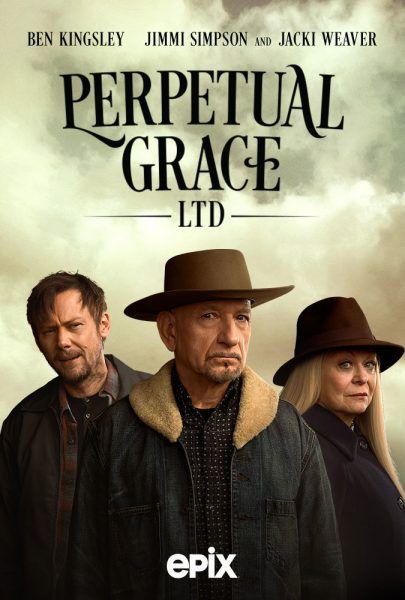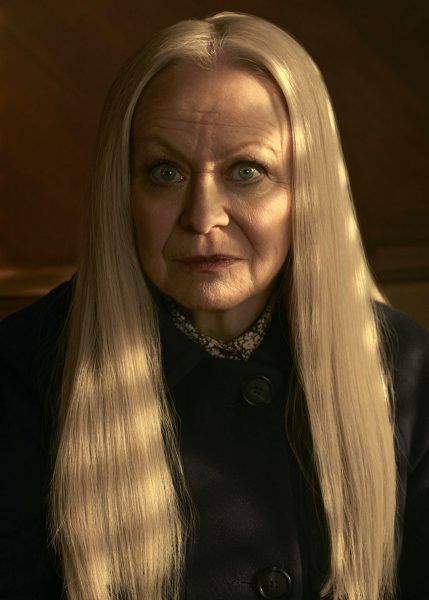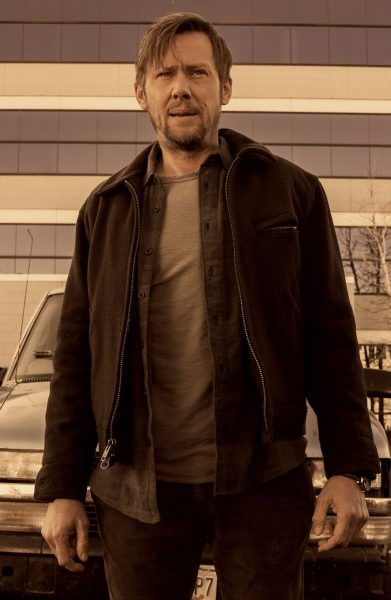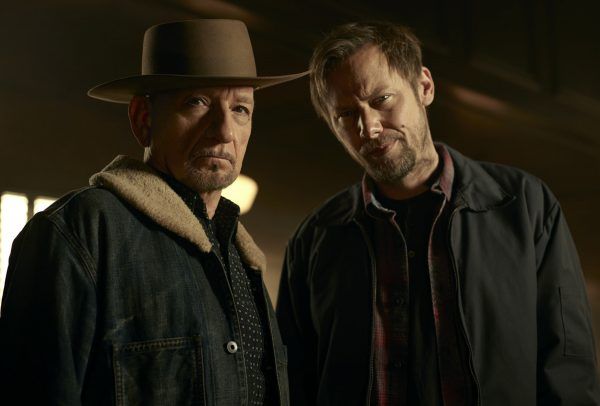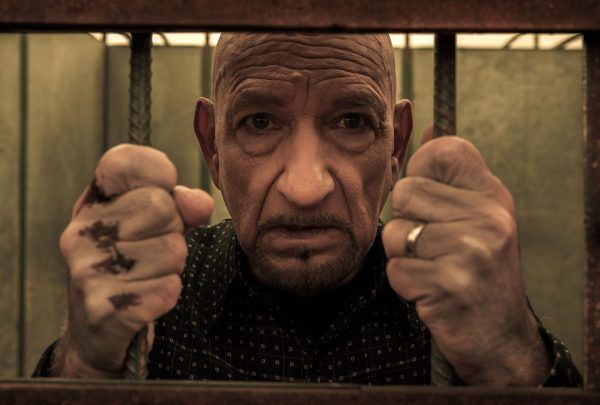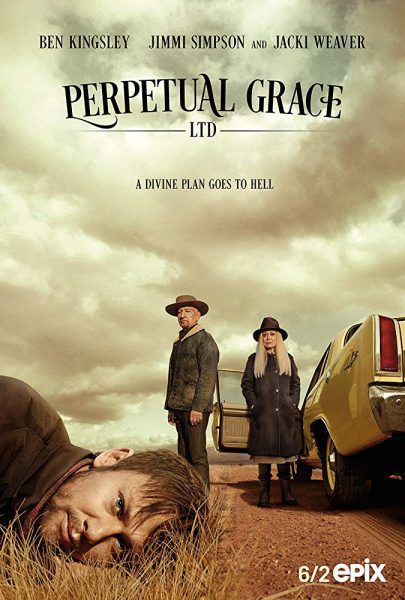From showrunners/writers/executive producers Steve Conrad and Bruce Terris (Patriot), the 10-episode Epix modern noir drama series Perpetual Grace, LTD follows James (Jimmi Simpson), a young grifter who quickly realizes that his prey, Pastor Byron Brown (Sir Ben Kingsley) and his wife Lillian (Jacki Weaver), known to their parishioners as Pa and Ma, are far more dangerous than anyone ever could have imagined. In over his head and out of his depth, what started as an escape from his demons brings James directly into the path of the couple who have used religion to steal the life savings of hundreds of innocent people who were just looking to get their lives back in order.
During this interview with Collider, co-stars Sir Ben Kingsley, Jacki Weaver and Jimmi Simpson, along with co-creators Steve Conrad and Bruce Terris, talked about how this series came about, finding the look and the mood of it, getting to play multi-layered characters in a multi-layered story, commonality in the actors, connecting to their roles, the unusual dynamic between James and Pa and Ma, what they appreciate about these characters, and hoping that people will invest in the journey of this series.
Collider: How did this come about, as far as figuring out the story that you wanted to tell, but also the look and the mood of it, as it all seems very specific?
STEVE CONRAD: We actually talk about mood, all the time. When we get notes from the studio, who’s been pretty supportive, they’re still puzzled over some of our cinematic decisions, and we’ll say, “But it has to create a mood.” Otherwise, you need to figure out another way to do it. That’s true of the writing, and it’s true of the way that you capture those things. Noir just has a mood in its DNA. This was Bruce Terris’ idea. The elemental idea of Perpetual Grace, LTD was Bruce’s, but we were joined at the hip on Patriot, where he’s an executive producer, so we’re always together. When we got sick of thinking about that one, we started to think about this one. And then, we got a little delay on Patriot, and this was ready to go. We thought we had hit a little bit of a stride there with storytelling, so we wondered if we could we keep it going and have a new group of fellow artists, who are a little different, like Jacki [Weaver] and Ben [Kingsley], bring us sounds that we haven’t been making. We put together a list of types, like a Ben Kingsley type and a Jacki Weaver type and a Jimmi Simpson type, which there aren’t because there’s just one of them. We did that because we didn’t want to presume that that could ever happen. I’m reminded of the obligation to do this well, on a daily basis, when I look at them. What I said to all of them, who have a million choices and they could be doing anything, but they said, “We’ll come do your thing,” I said, “You’ll have a good day’s work, every day. That’s what I can promise you. I can’t tell you how many pages that might be, but every time you come to the set, it’ll be a good day’s work.” Our job just becomes doing that, in relation to film noir. Can you have performances that stress-test what noir characters were ever allowed to do before? That’s what we’re trying to do on Perpetual Grace.
BRUCE TERRIS: Just expanding on the idea of noir characters, oftentimes in noir, it seems like the characters are a bit one-dimensional. There’s the bad guy and the good guy, and the evil guy. I’ve known Steve for 20 years, and he’s really been my mentor, as a writer, and what he really taught me, which my experience as a human backs up, is that there really are no one-dimensional characters because there are no one-dimensional people. And if you’re going to do 10 hours of television, or 20 or 30 or 40, or whatever we’re hopefully able to do, the character in a noir who might be the evil guy might work in a film for two hours, but over the course of 10 hours, you’ve got to see that person’s humanity, their frailty, and the people that they love.
CONRAD: It about all of their complexities, really. When your show needs to become more complex, then maybe it’s time for your characters to become more complex.
For you guys, as actors, when this was brought to you, did you have any idea what it was going to be, or how it was going to look, or did you have a lot of questions, in that regard?
JACKI WEAVER: I think I asked Steve questions, every day. One of the things I like about being an actor is playing multi-layered characters in a multi-layered story, and this, of course, is a golden example of that. Everyone’s got flaws, and all of these characters have flaws. You can’t help feeling a certain empathy with all of them.
CONRAD: When we got our cast together, what I noticed was a commonality in the actors that we were asking to come join us. Each one of them has a foundational strength. Noir really is about weakness, but in order for you to get all the way home, that foundational strength must become the thing that you begin to write about. With Jacki’s performance in Animal Kingdom, the minute she ascends that hallway corridor and you see her for the first time, it’s just remarkable. I knew that character, from that moment, was gonna be arresting and complex. So, we have actors who can do that, at our disposal, every day, and we have such faith and good cheer from them, that the show is stress-testing the actors, at the same time that we’re stress-testing the genre.
Jimmi, it feels like Westworld was an interesting turning point in your career, and it’s harder to guess where your characters fit into the stories that you’re telling. Did it feel like this was the perfect representation of that, especially without really knowing what to make of this guy?
JIMMI SIMPSON: Yeah, I think you’re dead on. I’m always drawn to the heart of something, and the past couple of years have allowed me to make a little bit more of that choice, as opposed to accepting whatever’s there. When I read this script, I had the reaction that we all had. And then, before my meeting with Steve and Bruce, I was told to see Patriot, which I hadn’t seen. I watched it and I was like, “Holy fuck, that’s how they’re gonna execute these emotional blankets, and this tapestry of so much stuff that’s really important. It’s going to be delivered in this way that I can’t stop watching.” And with Steve as the director, there’s something really special there. I’m drawn towards stylized directors, but not directors who show you style, just for any reason. I like directors like Stanley Kubrick, Paul Thomas Anderson, Orson Welles and even the Coens, where they take their style and it’s heightened, but it simplifies the concept they’re trying to get you to understand and it creates this explosion in your brain, where you’re heart is just knocked on and your eyes are exploded, and you have this fall-in, full-on experience. So, I read the script and I saw how they execute these ideas, and it was just a one-two punch that I couldn’t really recover from. Each day, these guys showed me another thing that I wasn’t quite expecting. In today’s TV landscape, you get used to a simplification on another level, which is that it’s just so accessible to everybody that the themes don’t even matter anymore. They’re just tropes, where you look at it and either clap or cry. This is the human experience, and it’s delivered to you brilliantly. It’s perfect.
There’s such an interesting stillness and quietness in the scenes.
CONRAD: Yeah, it’s crazy, we just got on that right away. This is a very still world. And then, it dawned on us later, after, that it just felt like the right way for us all to be performing. Everybody is trying to figure the other person out, and there are wheels turning, in those moments where the only thing that’s moving is the organ of the brain, to try to figure out why this guy has this weird chant with the f-word in it, and he’s a priest. Stillness allows for the audience to hear our characters thinking. The chess match of the series is more clearly on the table when we’re more still.
Since we don’t get to see too much of it, what do you like about the relationship dynamic between Ma and Pa?
WEAVER: It’s wonderful. She obviously adores him, and he adores her. They are two parts of a whole. They’re the elderly couple who, when one of them dies, the other one will die, very soon.
CONRAD: You’re not elderly. That’s the craziest thing. I don’t think anybody’s gonna believe that, in the show, that character is 74.
WEAVER: Well, I’m not 74, she said wistfully. But you know how you hear stories, over and over, about how, when a couple who have been married 50 years and one of them dies, the other one dies very soon, afterwards. I think that’s the kind of relationship that they have. They are so locked in. To get personal, my parents where married 50 years, and they never had a cross word. They adored each other. And I blame them for the fact that I’ve been married four times. I keep looking for their relationship.
CONRAD: They help each other survive, in a practical sense. It’s exactly what they did for each other when they met, and what they continue to do. In each of their cases, it’s the only person that’s doing that for them. If you had to reduce the show to one essential word that might explain everything you’re seeing, the struggle to survive is probably it. And then, the other characters come by love, and love helps them survive. But Pa and Ma have that sustaining love that lets you survive.
BEN KINGSLEY: I think the piece is so beautifully written. All of us having an opportunity to inhabit this biblical landscape, for 10 hours of film, is bound to give us thought that we would not have had, had we not been in this series. Therefore, one examines tenacity and one examines faith, subconsciously and automatically. I don’t meditate at home on these issues. It’s just woven into every time you get actors in front of the cameras, their consciousness is woven into our expression of that character. There is a conviction, in all of this. For those that are lost, those that are search, those that have arrived, and those that have arrived and then are disappointed to find they’ve not arrived, there’s a springboard of conviction behind every character, which is pretty wonderful to work with.
There’s such an incredible ensemble of actors in this.
CONRAD: Remarkably, we can attribute this ensemble to Sir Ben who was the first piece that fell into place. When Sir Ben is your first, it’s a little easier to get the second. You can call Luis Guzmán and say, “Hey, can you come to New Mexico for four months.” When he says, “Who else is in the show?” You can say, “Ben Kingsley.” And he said, “Shit, all right, I’ll be there.” When we started to make television with Patriot, Bruce and I took our friend, Melissa Bernstein, who produced Breaking Bad, out to dinner, and I said, “How does TV start to look like TV? I don’t wanna be in it, if that’s gonna happen. How does quality control show up on screen? What should I be looking out for?” And she said, “If you have a very strong lead, you have to strive to make sure that the rest of that world is just as good as that person, or they won’t be able to hit the ball back, and you won’t feel like you’re watching a sport anymore. Your attention will slacken. If the ensemble is not as strong as its strongest member, the hum of the show will be lesser than. If you have 20 actors, you’re gonna have three who just aren’t great.” And we don’t. It’s true of Jimmi, it’s true of my brother (Chris Conrad), it’s true of Luis, and it’s true of Damon Herriman, who people will be seeing much more of this year. He’s just as strong as the strongest one among us.
Jimmi, what did you enjoy about the dynamic that your character has with Ma and Pa?
SIMPSON: Part of James’s conundrum is that you open up the package in that first episode, and then he has to figure things out remotely, in a lot of ways. You’re seeing a man trying to be in about seven places at once, while figuring out who he is, at the same time. He’s trying to save his own life. That’s his situation. He’s a little bit overwhelmed, and that’s what he has to figure out. How are you constantly overwhelmed more, by each next thing, and still walk firmly towards your goal?
CONRAD: One of the goals that Bruce and I had, from the on-set, in relation to the genre, was that when you get to the end, generally that character is just shattered by the events, and shattered by the certain-ness of his failure. I thought, “What if you started with a guy like that?” So, he arrives to us, for the first time, like that already. And then, we stress test how much more he can take, and what call of the wild he’ll answer to, to survive, if everything to this point has not worked. He looks up and finds himself in the middle of a heavyweight fight with a person he did not expect to be in there with, and he just has to survive it, with very little resources that aren’t wrung out. What ends up happening to him is that this world around him, when he’s grasping for strength in others, he starts to find it in groups of like-minded sufferers, all of whom Pa has preyed on, but who remain there now to collect up the pieces and to become a single unit of people who want retribution. Maybe as a group of 10, they can fight Pa off.
It seems like there’s no way that he’s not going to regret what he’s gotten himself into.
TERRIS: We thought it was a fascinating idea that, if you have problems and you’re shattered, and the answer to your problems is to assume the identity of somebody else, you better make sure that the person who’s identity you’re assuming is not in worse trouble that you are. Because James is so shattered, he’s not able, at the beginning, to see everything. As he’s becoming Paul Allen Brown, he’s not able to see the mess that, just by saying that he’s Paul Allen Brown, he’s already got himself into, and he’s got to contend with that too late.
SIMPSON: And their casting is just so resonant. It just so happens that I’ve had some pretty serious restarts, and I should have lost my life twice. Like everybody, I’ve had this divorce, and all of these things that have gotten me to a point, where I know what it feels like when you’re done. And then, that little spark of your own potential is there, and you just put your faith in it and keep moving forward. The little joys that come, and the things that you learn from being pounded and hammered, I’m acutely aware of that. I think that’s just subconsciously helping James get through this. I don’t think he’s quite aware of it yet, but it’s a truth. That’s what Steve and Bruce are working towards. That’s a reality. We can do it. We can get there.
Pa is such an interesting character to watch because you don’t know what’s going to happen, or how he’s going to react to it, or how that’s going to affect everything else.
KINGSLEY: Great pieces of mythology that guide us over centuries are populated by archetypes. They’re not populated by copies of a copy of a copy, which is what Steve and Bruce very skillfully avoided, from day one. Very often, as audiences, we’re invited to see a copy of a copy of a copy, and it’s immediately lost our interest. Human beings do respond to archetypes.
CONRAD: I agree, and this is the time where TV has to take the responsibility of that. It’s not even a goal to be good anymore. It never comes up. If anybody asks me to play a hand in making a film, and they explain to me what their ambitions are, none of their ambitions are ever to make a good film. It never comes up. And now, in this landscape of television, it’s almost a requirement that you try to do that. Based on the crowded atmosphere of this world, you have to strive to be distinguished. It’s a good thing that we have a place to do this. Our resources are still TV resources. Our work days are demanding, and people get sick. After Patriot, our cinematographer got pneumonia, and Mike Dorman, our lead actor, got pneumonia. They got physically sick, due to the TV pattern that is imposed on us by the studio, simultaneous to the demand that we make something that’s very good. Those two things are unsustainable together, but we are not quitting trying, on our side. I hate to be the guy who’s complaining about this job because it’s a beautiful job, but when people go to the hospital. at the end of your show, something’s wrong. One of my jobs on this show is to make sure all of our artists are safe, and I’m not sure we have a safe working environment, within these days of modern television.
As actors, no matter how long you’ve been in this business and how many different characters you’ve played, what’s it like to find a project like this, where you’re getting to play and explore characters that you haven’t gotten to? Are there things that you started to appreciate about these characters, the longer you played them?
KINGSLEY: I think appreciation and recognition grows as you work with the character. I always consider myself the custodian of the character, and I feel a little bereft when he’s no longer under my care. I wonder what he’ll do without me. I wonder, “What’s Pa going to do, when I’m not playing him? Is he going to be a lost soul, drifting around unanchored?
WEAVER: He’ll be in limbo or purgatory.
KINGSLEY: Until I’m hooked onto him again, and he’ll be relieved to see me. Jimmi has been very candid in saying that a mirror has been held up to his journey. I love animals in their pure form. Pa is an animal, in its purest form, like a leopard or a panther. He’s a predatory creature, in it’s pure, intelligent, beautiful, graceful and horrendous form, and I love to occupy him. I’m not him. So many people make the mistake of casting a wounded warrior with a wounded actor. The great thing about acting is that, if you have two trapezes over your circus ring, the joy is to see the trapeze artist move from one trapeze to the other. It’s the spin in mid-air that makes the audience gasp with joy and pleasure. If you’re not leaping away from yourself, as an actor, there’s nothing to watch. I am not Pa. Absolutely not, but I love that leap.
CONRAD: He does not have limitations. He’s still creating the spectrum. To play both Gandhi and Don Logan from Sexy Beast, exquisitely, and everything in between, the show knows that about this actor, so we get in and go. I’m very well aware of the power that we have at our disposal, and we’re using it. Pa is a wild animal, but he’s a wild human. Our job is to unleash that, and then make that work in noir. If we can keep the quality control up, that outta just be delightful, and if it’s not, then we’ve got something wrong.
WEAVER: As a theater actor, I’ve been in about 90 plays, and I was brought up to respect text and dialogue. It’s all in the text and the writing. It’s extraordinary. You don’t have to wonder about how to say it ‘cause it’s all there. I don’t know if Steve would call himself a poet, but he is a poet.
CONRAD: I’ve had a long career of people not hearing what I’m hearing, and the disappointment of watching something miss by a mile because it’s not believable. It’s a fate that I’ve had, for most of my career, until Patriot and Perpetual Grace. It isn’t just the text, it’s the text and the artist who knows that it’s music, and that there ought to be a way to do that. That kind of has eluded me, up until Patriot. I couldn’t direct, and I wasn’t able to make the relationships with actors that allow you to have less distance between the two of you.
WEAVER: I’m aware that, even if you change one word, that might be a word that the writer spent a day worrying about.
CONRAD: And if you say that, as a writer on a movie, nobody listens to you. They laugh at you. They excuse you, and they laugh at you when you leave the room.
WEAVER: I was brought up doing Shakespeare and Tom Stoppard, and you don’t change their words. You should observe that, right across the board. Just as Ben was saying that he’s not Pa, I’m not Ma, but I really enjoy getting into her skin, with those weird clothes that she wears and the cadence of what she says. Quite often, it’s not the way that people naturally speak, and I love that. She’s there for me, on the page. I’m just the servant.
CONRAD: Noir is a stylized world. The play of dark and light that exists in noir, doesn’t really exist to your eye, in that way. It’s already a genre that asks you to be a little arch and presentational. It helps to remind the audience what genre they’re watching, so that they stay interested. That world exists, only to make sure that we’re always inside of that genre, so that we can then be surprising, on those terms. We are not reinventing the terms of the show, with every episode. It obeys that genre the most. It’s about, “I am in too deep. This next move of mine will get me out.” But when it makes matters worse, it’s about, “What now?” That’s what noir is.
I definitely appreciate how much everything seems to be so very well thought out, from the dialogue, to the way the character’s reveal themselves, to how it looks, to the location. All of it seems like a lot of time was spent really thinking about it.
TERRIS: As a director, one of the things that Steve brought to it was to do a daytime noir. Noir is so often done at night, and everything is in shadow, but there’s this hard light of the American West, particularly in New Mexico. Steve brought this beautiful aesthetic to it, and I feel like, when I’m watching it, that I’m watching Sergio Leone. It’s this epic confrontation that’s taking place among these people that are spread all over the landscape. That vision was all Steve, just being able to see that for what it was and is.
CONRAD: We’re in an age where someone you know has to tell you that you would like [a TV show] because billboards don’t work. Someone you trust has to say, “Seriously, you have to watch this show.” We have to get into someone’s life, in a way that makes them feel excited to have this place to go. If you get half-way through a show and go, “Oh, man, maybe that wasn’t the best investment of my time,” you feel a little cheated by it and a little broken up with by somebody. You’re like, “Damn, all that time. I invested six hours in that, and it was all a dream?!”
Perpetual Grace, LTD airs on Sunday nights on Epix.


